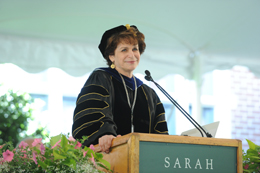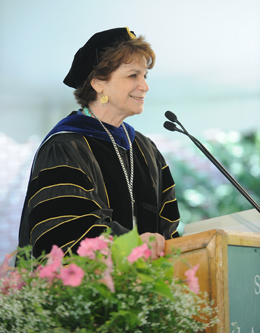 On behalf of the Trustees, faculty, and staff of Sarah Lawrence College, I am delighted to welcome you to the Commencement of the class of 2012. To the graduating class, let me say that we have taken great pleasure in witnessing in you the "transformative" effect that Sarah Lawrence alumni identify as the legacy of their educations.
On behalf of the Trustees, faculty, and staff of Sarah Lawrence College, I am delighted to welcome you to the Commencement of the class of 2012. To the graduating class, let me say that we have taken great pleasure in witnessing in you the "transformative" effect that Sarah Lawrence alumni identify as the legacy of their educations.
Along with our graduates, today we honor the family members in the audience, particularly the parents, whose love and commitment have supported our students. Thank you for entrusting us with your daughters and sons for these past few years. Members of the Class of 2012, would you please stand and recognize the family members and friends who have made this moment possible?
I have attended commencements at other institutions, but I have never seen anything like the rousing response of the graduates when their teachers and dons proceed down the aisles at Commencement. Through their ovation, the class acknowledges that the heart and soul of the Sarah Lawrence experience is the relationship between each student and his or her faculty mentors. Of course, at any institution, the quality of the faculty in large part determines the quality of the education. But the artisanal nature of both teaching and learning at Sarah Lawrence leads to a student-faculty relationship that is unparalleled. Handmade and crafted by teacher and student together, the singular education this College offers depends on faculty who understand that people learn in different ways and at different tempos and that there is no one path to becoming an educated person. That understanding translates into an extraordinary commitment of time and care. As I meet with alumni around the country from many different graduating classes, they cite their relationships with their dons and faculty as some of their most enduring memories of the College . . . all of which is reason to thank the faculty publicly for continuing to be the most committed teachers within the landscape of American higher education today.
I have used a number of phrases to describe the Sarah Lawrence difference—"singular education," a term that attempts to capture both our focus on the individual and our distinctiveness; "artisanal," which refers to the non-assembly line approach we take to teaching and learning; and "transformative." In the current climate of skepticism about the value of higher education, it is imperative for us to find the right language, stories, images, and examples to convey the way in which the education we offer matters in the lives of our students and the work they go on to do in the world. It is difficult to do so in a sound bite, but I must say I thought that in her interview with CBS Sunday Morning, senior Meghan Roguschka did a superb job exemplifying the intellectual confidence and poise that is the outcome of an SLC education. Although the CBS editor's cutting-room floor is strewn with descriptions of the value and uniqueness of a Sarah Lawrence education that Meghan and I both provided in our interviews, the College welcomed the chance to confront publicly the myths that circulate about Liberal Arts Colleges and SLC in particular.
In a short while, I will have the pleasure of introducing someone who is an old hand at "busting myths" on national television and who actually conducts scientific experiments to "blow up" received ideas, sometimes in a very literal way. As anyone knows who has watched Adam Savage's show, this tack can be a risky proposition—like taking the chance that a yodeler can cause an avalanche with his voice alone! In my remarks to you today, however, I'd like to speak about the kind of risk-taking that rarely leads to broken bones, but can be equally fearless. It involves the courage to embrace the risk of failure in intellectual and creative pursuits. This is the kind of courage that is fundamental to the philosophy of education at Sarah Lawrence. I recognize that it may seem paradoxical to speak of failure to a class successfully graduating from the College, but I'd argue it makes perfect sense in the context of a Sarah Lawrence graduation. To be more specific, I want to tie this philosophical principle to one of our most important educational practices at SLC, our focus on narrative evaluations instead of grades.
Most of you in the audience know that the faculty do assign grades at the end of a course, whether semester or year-long. We do so in recognition that we live in a world where grades are a factor in awarding scholarships, fellowships, admission to graduate school, even employment, and we do not want to jeopardize our students' transition to the world beyond the campus. But as you also know well, the focus of both faculty and students at SLC has never been on the grade—it is, instead, on the continuous feedback and close collaboration between teacher and student through the conference system and on the narrative evaluations that faculty write in every course on and for every student. Our pedagogy is based on the belief that these nuanced assessments of the student's intellectual qualities and character are far richer representations of the learning process—both for internal purposes (where grades are not even used) and externally, when they are incorporated into letters of recommendation.
This practice discourages the kind of fear of failure that is rampant in many colleges and universities today, where the grade is the goal and the learning path between point A and point B is envisioned as an efficient straight line. At such institutions, the refrain "what do I need to do to get an A?" is all too familiar. I have never heard this refrain at Sarah Lawrence.
 Recently, in an article called "Next Time, Fail Better" in the Chronicle of Higher Education, Paula Krebs, a Professor of English at Wheaton College, argued that computer science, and the sciences in general, know how to incorporate failure into the learning process. Krebs drew disciplinary distinctions between the way that failure is treated in the field of computer sciences and the way it is treated in the Humanities. Her colleague in computer science had taught her that "the work of coding … [is] an endless round of failure, failure, failure before eventual success. Computer-science students," she wrote, "are used to failing . . . it's built into the process, and they take it in stride. A computer program that doesn't run is a failure. A program that produces no usable data about the text it was set up to analyze is a failure. Why don't those failures devastate the developers? Because each time their efforts fail, the developers learn something they can use to get closer to success the next time."
Recently, in an article called "Next Time, Fail Better" in the Chronicle of Higher Education, Paula Krebs, a Professor of English at Wheaton College, argued that computer science, and the sciences in general, know how to incorporate failure into the learning process. Krebs drew disciplinary distinctions between the way that failure is treated in the field of computer sciences and the way it is treated in the Humanities. Her colleague in computer science had taught her that "the work of coding … [is] an endless round of failure, failure, failure before eventual success. Computer-science students," she wrote, "are used to failing . . . it's built into the process, and they take it in stride. A computer program that doesn't run is a failure. A program that produces no usable data about the text it was set up to analyze is a failure. Why don't those failures devastate the developers? Because each time their efforts fail, the developers learn something they can use to get closer to success the next time."
Learning from negative results is an important lesson for students in all disciplines, according to our own Scott Calvin, who teaches physics at SLC, but in response to Krebs, he says that it is not easy even for students in science. Scott counters that students in the lab "almost invariably start by wanting to blame 'human error' or 'faulty equipment' for the failure of an experiment, but that kind of generic shrug doesn't get us anywhere….I'm glad that in good years (and this was a good year), my students in general physics eventually gain the ability to take 'failed' experiments and turn them into compelling papers exploring the physics of what actually happened."
Although the process of confirming or disconfirming hypotheses may be clearest in the sciences—and is the model for the exciting "myth-busting activities" which we will hear about in a little while—it is the structuring of goals in the learning environment that is of primary importance in cultivating intellectual risk-taking. Through the conference system at Sarah Lawrence, our students participate in a process of feedback, both positive and negative, that helps them actively learn to reflect on what works and what needs improving. Focusing on the process rather than the grade allows the student to try out ideas, revise, jettison, revise again. It depends upon learning goals, rather than performance goals—in other words, learning French rather than getting an A in French. Self-motivation rather than extrinsic rewards fuels the learning process.
The kind of learning process you have all participated in at Sarah Lawrence means that in the SLC classroom and conference work, the "risky business" of learning happens in a safe environment—safe, but not too comfortable! This laboratory allows hypotheses to rise and fall, toward the goal of inculcating a habit of long-term and life-long learning. And this process happens in the humanities, the sciences, the social sciences, and the arts at SLC. Such "risky business" is the opposite of the devastating short-term, extrinsic reward-driven thinking that has wreaked havoc on our economy and has burst yet again into this week's headlines.
John Dewey wrote, "The aim of education is to enable individuals to continue their education . . the object and reward of learning is continued capacity for growth." Intellectual courage is necessary to that growth. As James Joyce's Stephen Dedalus put it, "Errors are the portals of discovery."
Class of 2012, Sarah Lawrence has helped you to find intellectual curiosity and courage and to pass through portals of discovery. Mobilize that passion for learning that we have worked to nurture in you at Sarah Lawrence.
We wish you the best as you continue the serious creative work in the world that you have begun here. We expect nothing less of you than to change for the better your communities, your workplaces, your relationships, your nations, and your world. And if in the process, you have to bust myths, that, too, is part of what it means to be a Sarah Lawrence graduate.
Congratulations. We salute you.